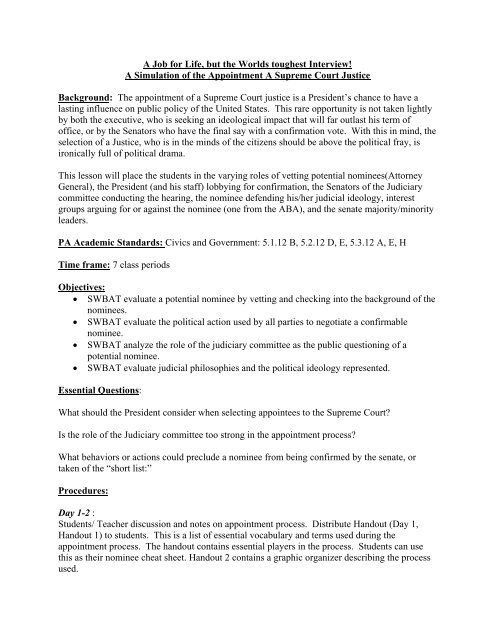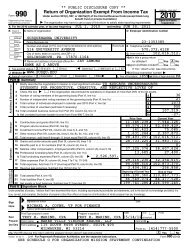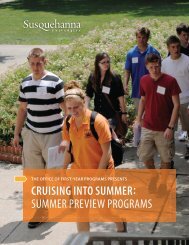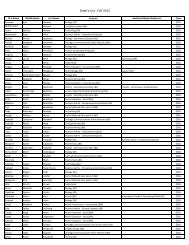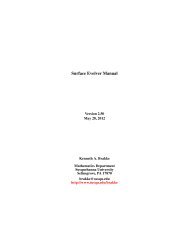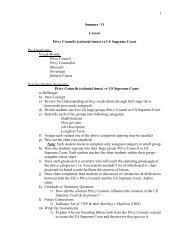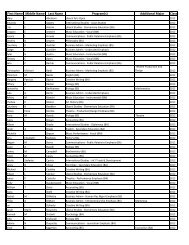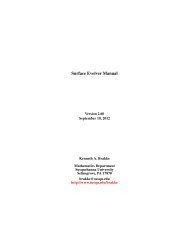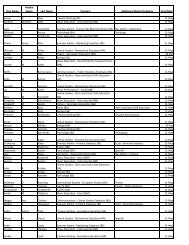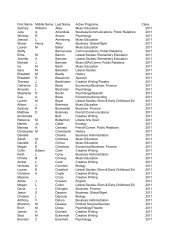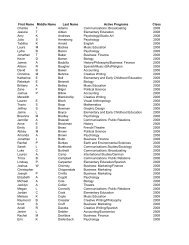A Job for Life, but the Worlds toughest Interview! A Simulation of the ...
A Job for Life, but the Worlds toughest Interview! A Simulation of the ...
A Job for Life, but the Worlds toughest Interview! A Simulation of the ...
Create successful ePaper yourself
Turn your PDF publications into a flip-book with our unique Google optimized e-Paper software.
A <strong>Job</strong> <strong>for</strong> <strong>Life</strong>, <strong>but</strong> <strong>the</strong> <strong>Worlds</strong> <strong>toughest</strong> <strong>Interview</strong>!<br />
A <strong>Simulation</strong> <strong>of</strong> <strong>the</strong> Appointment A Supreme Court Justice<br />
Background: The appointment <strong>of</strong> a Supreme Court justice is a President’s chance to have a<br />
lasting influence on public policy <strong>of</strong> <strong>the</strong> United States. This rare opportunity is not taken lightly<br />
by both <strong>the</strong> executive, who is seeking an ideological impact that will far outlast his term <strong>of</strong><br />
<strong>of</strong>fice, or by <strong>the</strong> Senators who have <strong>the</strong> final say with a confirmation vote. With this in mind, <strong>the</strong><br />
selection <strong>of</strong> a Justice, who is in <strong>the</strong> minds <strong>of</strong> <strong>the</strong> citizens should be above <strong>the</strong> political fray, is<br />
ironically full <strong>of</strong> political drama.<br />
This lesson will place <strong>the</strong> students in <strong>the</strong> varying roles <strong>of</strong> vetting potential nominees(Attorney<br />
General), <strong>the</strong> President (and his staff) lobbying <strong>for</strong> confirmation, <strong>the</strong> Senators <strong>of</strong> <strong>the</strong> Judiciary<br />
committee conducting <strong>the</strong> hearing, <strong>the</strong> nominee defending his/her judicial ideology, interest<br />
groups arguing <strong>for</strong> or against <strong>the</strong> nominee (one from <strong>the</strong> ABA), and <strong>the</strong> senate majority/minority<br />
leaders.<br />
PA Academic Standards: Civics and Government: 5.1.12 B, 5.2.12 D, E, 5.3.12 A, E, H<br />
Time frame: 7 class periods<br />
Objectives:<br />
• SWBAT evaluate a potential nominee by vetting and checking into <strong>the</strong> background <strong>of</strong> <strong>the</strong><br />
nominees.<br />
• SWBAT evaluate <strong>the</strong> political action used by all parties to negotiate a confirmable<br />
nominee.<br />
• SWBAT analyze <strong>the</strong> role <strong>of</strong> <strong>the</strong> judiciary committee as <strong>the</strong> public questioning <strong>of</strong> a<br />
potential nominee.<br />
• SWBAT evaluate judicial philosophies and <strong>the</strong> political ideology represented.<br />
Essential Questions:<br />
What should <strong>the</strong> President consider when selecting appointees to <strong>the</strong> Supreme Court?<br />
Is <strong>the</strong> role <strong>of</strong> <strong>the</strong> Judiciary committee too strong in <strong>the</strong> appointment process?<br />
What behaviors or actions could preclude a nominee from being confirmed by <strong>the</strong> senate, or<br />
taken <strong>of</strong> <strong>the</strong> “short list:”<br />
Procedures:<br />
Day 1-2 :<br />
Students/ Teacher discussion and notes on appointment process. Distri<strong>but</strong>e Handout (Day 1,<br />
Handout 1) to students. This is a list <strong>of</strong> essential vocabulary and terms used during <strong>the</strong><br />
appointment process. The handout contains essential players in <strong>the</strong> process. Students can use<br />
this as <strong>the</strong>ir nominee cheat sheet. Handout 2 contains a graphic organizer describing <strong>the</strong> process<br />
used.
Days3-4<br />
• Divide <strong>the</strong> class into role-playing groups as follows:<br />
Group 1: Attorney General and staff (3 students)<br />
Group 2: President and Staff (4 students)<br />
Group 3: Senate Judiciary Committee (8 or more)<br />
Group 4: Interest Groups (One is <strong>the</strong> ABA, <strong>the</strong> o<strong>the</strong>rs are created)<br />
Group 5: Reporter/ Videographer (2 students)<br />
Group 6: Nominees (3 students)<br />
Group 7: Majority/ Minority Leaders<br />
• Distri<strong>but</strong>e role Cards to each student in each group. These role cards will provide<br />
students instructions on selecting each justice.<br />
• The process starts with <strong>the</strong> attorney general who will read <strong>the</strong> background reports <strong>of</strong><br />
potential nominees with <strong>the</strong>ir staff, he/she will select 3 candidates <strong>for</strong> <strong>the</strong> Short List to be<br />
<strong>for</strong>warded to <strong>the</strong> President. The Attorney general group will answer questions on (Day3<br />
Handout1)<br />
• The president and his/her staff will review <strong>the</strong> AGs findings, and interview <strong>the</strong> three<br />
nominees. The president will make a selection, confer with Senate leadership, and<br />
announce it in a press release. (Day 3, Handout 2)<br />
• Senate Judiciary committee: create questions <strong>of</strong> <strong>the</strong> nominee, being mindful <strong>of</strong> party<br />
affiliation. Chairman will run eventual hearing. (Day 3, Handout 3)<br />
• Interest groups : The bar associate will recommend which nominee it sees as fit and<br />
which ones it is opposed to, and <strong>the</strong>n lobby <strong>the</strong> Judiciary committee <strong>for</strong> or against <strong>the</strong><br />
presidents choice. Two o<strong>the</strong>r groups, Liberal Justice, Conservatives in <strong>the</strong> Courtroom<br />
will lobby <strong>for</strong> or against <strong>the</strong> prospective nominee. (Day 3, Handout 4)<br />
• Minority/Majority Leaders: Give instructions about party recommendations to party<br />
members on panel, give instructions to Senators <strong>for</strong> <strong>the</strong> floor vote. (Day 3, Handout 5)<br />
• Reporter/Videographer- Reporter will write daily reports/editorial <strong>of</strong> events and<br />
videographer will tape <strong>the</strong> reports and <strong>the</strong> hearing. (day 3, Handout 6)<br />
• Nominees (day 3, Handout 7) The nominees will prepare <strong>for</strong> questions <strong>of</strong> <strong>the</strong> presidential<br />
interview and <strong>of</strong> <strong>the</strong> Judiciary committee.<br />
• Days 4-5 will be research days.<br />
Day 5<br />
• The Judiciary Committee will hold a hearing to investigate <strong>the</strong> merits <strong>of</strong> a potential<br />
nominee.<br />
• Committee will recommend a floor vote at <strong>the</strong> end <strong>of</strong> <strong>the</strong> period.<br />
Day 6<br />
• Each student will be handed a card as <strong>the</strong>y walk into class. They will be randomly given<br />
a Democrat, Republican, or Independent card. Each student, regardless <strong>of</strong> previous roles<br />
(except <strong>the</strong> minority/majority leaders and interest groups), will be senators and must vote<br />
<strong>for</strong> or against <strong>the</strong> nominee. The majority and minority leaders will attempt to keep <strong>the</strong>ir<br />
members in line and each interest group will have 2 minutes to lobby <strong>the</strong> Senate.<br />
• A class room discussion will follow <strong>the</strong> vote on <strong>the</strong> process.
Day 7- A <strong>for</strong>mal assessment/test will be given on <strong>the</strong> appointment process.<br />
Materials:<br />
• Copies <strong>of</strong> each <strong>of</strong> <strong>the</strong> Handouts<br />
• Student government textbook.<br />
• Computer access <strong>for</strong> research.<br />
Assessment:<br />
• Students will be assessed on <strong>the</strong>ir role questions sheets and accuracy <strong>of</strong> <strong>the</strong>ir roles.<br />
(see rubric)<br />
• Formal test on concepts and process.
A <strong>Job</strong> For <strong>Life</strong><br />
The Supreme Court Appointment Process<br />
Key Vocabulary: Take notes on each term/ concept as we discuss.<br />
Vetting-<br />
Short List-<br />
Article II, Section 2 “Appointments Clause”-<br />
Nominee:<br />
Confirmation Hearing:<br />
Key Players in <strong>the</strong> Appointment process. Take notes on <strong>the</strong> role <strong>of</strong> each person.<br />
President-<br />
Presidential Staff-<br />
Attorney General-<br />
Senate Judiciary Committee-<br />
Chairman <strong>of</strong> <strong>the</strong> SJC:<br />
Interest Groups-<br />
ABA-<br />
Minority/Majority Leader-
A <strong>Job</strong> For <strong>Life</strong><br />
Diagram <strong>of</strong> <strong>the</strong> Appointment Process<br />
=<br />
Attorney General<br />
President and Staff<br />
Senate<br />
Senate Judiciary Comm.<br />
Senate Floor Vote
Supreme Court Candidate Biographies
Richard Allen Rebb (born January 11, 1939, in New York City) is currently a judge on <strong>the</strong><br />
United States Court <strong>of</strong> Appeals <strong>for</strong> <strong>the</strong> Seventh Circuit. He is one <strong>of</strong> <strong>the</strong> most influential living<br />
legal <strong>the</strong>orists [1] and a major voice in <strong>the</strong> law and economics movement, which he helped start<br />
while a pr<strong>of</strong>essor at <strong>the</strong> University <strong>of</strong> Chicago Law School. He currently serves as a lecturer at<br />
<strong>the</strong> Law School.<br />
Rebb is <strong>the</strong> author <strong>of</strong> nearly 40 books on jurisprudence, legal philosophy, and several o<strong>the</strong>r<br />
topics, including The Problems <strong>of</strong> Jurisprudence; Sex and Reason; Overcoming Law; Law,<br />
Pragmatism and Democracy; and The Problematics <strong>of</strong> Moral and Legal Theory.<br />
Biography<br />
Rebb graduated from Yale College (A.B., 1959, summa cum laude), majoring in English, and<br />
from Harvard Law School (LL.B, 1962, magna cum laude), where he was first in his class and<br />
president <strong>of</strong> <strong>the</strong> Harvard Law Review. After clerking <strong>for</strong> Justice William J. Brennan <strong>of</strong> <strong>the</strong><br />
United States Supreme Court during <strong>the</strong> 1962-63 term, he worked <strong>for</strong> <strong>the</strong> Antitrust division <strong>of</strong><br />
<strong>the</strong> U.S. Department <strong>of</strong> Justice. In 1969, he joined <strong>the</strong> faculty <strong>of</strong> <strong>the</strong> University <strong>of</strong> Chicago Law<br />
School, where he remains a senior lecturer and where his son Eric Rebb is Pr<strong>of</strong>essor. He was a<br />
founding editor <strong>of</strong> <strong>the</strong> Journal <strong>of</strong> Legal Studies in 1972. President Ronald Reagan appointed<br />
Rebb to <strong>the</strong> Seventh Circuit in 1981. He served as Chief Judge <strong>of</strong> that court from 1993 to 2000.<br />
Rebb is an unusual combination <strong>of</strong> a pragmatist in philosophy, a classical liberal in politics, and<br />
an economist in legal methodology. A 2004 poll by Legal Affairs magazine named Rebb as one<br />
<strong>of</strong> <strong>the</strong> top twenty legal thinkers in <strong>the</strong> U.S. [1] A prolific author <strong>of</strong> articles and books on a wide<br />
range <strong>of</strong> topics including <strong>the</strong> 2000 presidential election recount controversy, President Bill<br />
Clinton's scandalous affair with Monica Lewinsky and his resulting impeachment procedure, and<br />
<strong>the</strong> 2008 invasion <strong>of</strong> Iraq. His analysis <strong>of</strong> <strong>the</strong> Lewinsky scandal cut across most party and<br />
ideological divisions. Rebb's greatest influence is through his writings on law and economics—<br />
The New York Times called him "one <strong>of</strong> <strong>the</strong> most important antitrust scholars <strong>of</strong> <strong>the</strong> past halfcentury."<br />
In December 2004, Rebb started a joint blog with Nobel Prize-winning economist Gary<br />
Becker.<br />
Robert S. Boynton has written in The Washington Post that Rebb will never sit on <strong>the</strong> Supreme<br />
Court because, despite his "obvious brilliance," he has taken a number <strong>of</strong> positions seen as<br />
"outrageous" such as his:<br />
• Contention in a 1999 Raritan article that <strong>the</strong> rule <strong>of</strong> law is an accidental and dispensable<br />
element <strong>of</strong> legal ideology;<br />
• Argument that buying and selling babies on <strong>the</strong> free market would lead to better<br />
outcomes than <strong>the</strong> present situation, government-regulated adoption; [2]<br />
• Tongue in cheek support <strong>for</strong> <strong>the</strong> legalization <strong>of</strong> marijuana and LSD. [3]<br />
In 2007 his review <strong>of</strong> Israeli Supreme Court Chief Justice Aharon Barak's book, The Judge in a<br />
[citation needed]<br />
Democracy caused quite a stir in Israel, renewing debate about judicial activism.
Legal positions<br />
Rebb's political and moral views are hard to summarize. His parents were affiliated with <strong>the</strong><br />
American Communist party, and in his youth and in <strong>the</strong> 1960s as law clerk to William J.<br />
Brennan he was generally counted as a liberal. However, in reaction to some <strong>of</strong> <strong>the</strong> perceived<br />
excesses <strong>of</strong> <strong>the</strong> late 1960s, Rebb developed a strongly conservative bent. Today, although<br />
generally considered a man <strong>of</strong> <strong>the</strong> right, Rebb's pragmatism, his qualified moral relativism and<br />
moral skepticism, [4] and his affection <strong>for</strong> <strong>the</strong> thought <strong>of</strong> Friedrich Nietzsche set him apart from<br />
most American conservatives. Among his o<strong>the</strong>r influences are <strong>the</strong> American jurists Oliver<br />
Wendell Holmes, Jr. and Learned Hand.<br />
Privacy - He famously opposed <strong>the</strong> right <strong>of</strong> privacy in 1981, arguing that <strong>the</strong> kinds <strong>of</strong> interests<br />
protected under privacy are not distinctive. He contended that privacy is protected in ways that<br />
are economically inefficient.<br />
Abortion - He has written several opinions sympa<strong>the</strong>tic to abortion rights, including a decision<br />
holding "partial-birth abortion" constitutionally protected in some circumstances.<br />
Breach <strong>of</strong> Contract - He has written favorably <strong>of</strong> efficient breach <strong>of</strong> contracts. Breach <strong>of</strong>ten<br />
leads to a worse result <strong>for</strong> society: if a seller breaches a contract to deliver building materials, <strong>the</strong><br />
buyer's workers might go idle while <strong>the</strong> buyer looks <strong>for</strong> a replacement. The lost production is a<br />
cost to <strong>the</strong> company and its workers and, as such, is a social cost. An efficient breach would be a<br />
situation in which <strong>the</strong> benefits are higher than <strong>the</strong> costs, because <strong>the</strong> seller is better <strong>of</strong>f <strong>for</strong><br />
breaching even after paying damages to <strong>the</strong> buyer (<strong>for</strong> instance, if some third party had a much<br />
greater need <strong>for</strong> <strong>the</strong> building materials, and was willing to pay a higher price <strong>for</strong> <strong>the</strong>m).<br />
Drugs - He has characterized <strong>the</strong> U.S.'s "War on Drugs" as "quixotic." In a 2008 CNBC<br />
interview, he discussed <strong>the</strong> difficulty <strong>of</strong> en<strong>for</strong>cing criminal marijuana laws and asserted that it is<br />
hard to justify <strong>the</strong> criminalization <strong>of</strong> marijuana compared to o<strong>the</strong>r substances.<br />
Animal Rights - Rebb engaged in a debate on <strong>the</strong> ethics <strong>of</strong> using animals in research with <strong>the</strong><br />
philosopher Peter Singer in 2001 at Slate magazine. He argues that animal rights conflicts with<br />
<strong>the</strong> moral relevance <strong>of</strong> humanity, and that empathy <strong>for</strong> pain and suffering <strong>of</strong> animals does not<br />
supersede advancing society. [5] He fur<strong>the</strong>r argues that he trusts his moral intuition until it is<br />
shown to be wrong, and that his moral intuition says "it is wrong to give as much weight to a<br />
dog's pain as to an infant's pain." He leaves open <strong>the</strong> possibility that facts on animal and human<br />
cognition can and may change his intuition in <strong>the</strong> future; he fur<strong>the</strong>r states that people whose<br />
opinions were changed by consideration <strong>of</strong> <strong>the</strong> ethics presented in Singer's book Animal<br />
Liberation failed to see <strong>the</strong> "radicalism <strong>of</strong> <strong>the</strong> ethical vision that powers [<strong>the</strong>ir] view on animals,<br />
an ethical vision that finds greater value in a healthy pig than in a pr<strong>of</strong>oundly retarded child, that<br />
commands inflicting a lesser pain on a human being to avert a greater pain to a dog, and that,<br />
provided only that a chimpanzee has 1 percent <strong>of</strong> <strong>the</strong> mental ability <strong>of</strong> a normal human being,<br />
would require <strong>the</strong> sacrifice <strong>of</strong> <strong>the</strong> human being to save 101 chimpanzees." [5]<br />
Torture - When reviewing Alan Dershowitz's book, "Why Terrorism Works: Understanding <strong>the</strong><br />
Threat, Responding to <strong>the</strong> Challenge", Rebb wrote that "If torture is <strong>the</strong> only means <strong>of</strong> obtaining
<strong>the</strong> in<strong>for</strong>mation necessary to prevent <strong>the</strong> detonation <strong>of</strong> a nuclear bomb in Times Square, torture<br />
should be used—and will be used—to obtain <strong>the</strong> in<strong>for</strong>mation. ... no one who doubts that this is<br />
<strong>the</strong> case should be in a position <strong>of</strong> responsibility."
Judge William H. Reigner Jr.<br />
U.S. Court <strong>of</strong> Appeals <strong>for</strong> <strong>the</strong> Eleventh Circuit<br />
Confirmed June 9, 2005<br />
• Judge Bill Reigner has earned a reputation as one <strong>of</strong> America’s most experienced and distinguished public<br />
servants. His nomination has received overwhelming support from across <strong>the</strong> ideological and political<br />
spectrum. Judge Reigner has been nominated to <strong>the</strong> Eleventh Circuit, which covers <strong>the</strong> states <strong>of</strong> Alabama,<br />
Florida, and Georgia.<br />
• Judge Reigner has had a distinguished career as a public servant, practicing attorney, and law pr<strong>of</strong>essor.<br />
o Judge Reigner was recess appointed by <strong>the</strong> President on February 20, 2004 to <strong>the</strong> Eleventh Circuit to fill a<br />
vacancy that is designated a "judicial emergency" by <strong>the</strong> Judicial Conference <strong>of</strong> <strong>the</strong> United States. He<br />
has served with distinction <strong>for</strong> over a year.<br />
o Judge Reigner was appointed as Attorney General <strong>of</strong> Alabama on January 2, 1997. After being elected to a<br />
full four-year term in 1998, Alabamians overwhelmingly reelected Judge Reigner as Attorney General in<br />
2002. He had previously served as Deputy Attorney General in charge <strong>of</strong> special civil and constitutional<br />
litigation.<br />
o Be<strong>for</strong>e joining <strong>the</strong> Attorney General’s Office, Judge Reigner practiced law in Birmingham, Alabama at two<br />
<strong>of</strong> <strong>the</strong> state’s finest law firms, specializing in commercial and complex federal litigation. He also taught<br />
several years as an adjunct pr<strong>of</strong>essor at <strong>the</strong> Cumberland School <strong>of</strong> Law <strong>of</strong> Sam<strong>for</strong>d University.<br />
• Judge Reigner is an outstanding and highly qualified candidate as evidenced by his pr<strong>of</strong>essional and<br />
academic credentials and training.<br />
o Judge Reigner began his legal career as a law clerk <strong>for</strong> a civil rights legend, <strong>the</strong> late Judge John Minor<br />
Wisdom <strong>of</strong> <strong>the</strong> U.S. Court <strong>of</strong> Appeals <strong>for</strong> <strong>the</strong> Fifth Circuit. Judge Wisdom achieved renown <strong>for</strong> his<br />
landmark decisions ordering and implementing desegregation in <strong>the</strong> wake <strong>of</strong> <strong>the</strong> Supreme Court’s historic<br />
ruling in Brown v. Board <strong>of</strong> Education and received <strong>the</strong> American Bar Association Medal, <strong>the</strong> ABA’s<br />
highest honor, in 1996.<br />
o Judge Reigner attended Tulane University School <strong>of</strong> Law, where he graduated magna cum laude in 1987<br />
and was editor-in-chief <strong>of</strong> <strong>the</strong> Tulane Law Review.<br />
• Judge Reigner's impressive record demonstrates his belief in <strong>the</strong> rule <strong>of</strong> law and treating all people equally<br />
under <strong>the</strong> law. As Judge Reigner stated at his hearing, "I understand my obligation to follow <strong>the</strong> law, and I have<br />
a record <strong>of</strong> doing it. You don’t just have to take my word that I will follow <strong>the</strong> law. You can look at my record as<br />
Attorney General and see where I have done it."<br />
o Judge Reigner ordered state prosecutors to interpret <strong>the</strong> Alabama Partial-Birth Abortion Ban Act narrowly<br />
and consistent with Supreme Court precedent even though <strong>the</strong> plain language <strong>of</strong> <strong>the</strong> statute permitted<br />
broader application.<br />
o Judge Reigner has done his duty as Attorney General to defend Alabama statutes from attack and defend<br />
Alabama taxpayers from huge money judgments.<br />
o Judge Reigner has been praised by a broad range <strong>of</strong> Alabama African-American leaders <strong>for</strong> his record <strong>of</strong><br />
fighting <strong>for</strong> civil rights and equal treatment under law <strong>for</strong> all.<br />
o Judge Reigner has advocated <strong>for</strong> a variety <strong>of</strong> new laws to protect women from domestic violence and<br />
helped create innovative new programs to help women.<br />
o Judge Reigner helped start Mentor Alabama, a program helping at-risk children.<br />
o Judge Reigner, while Attorney General, represented <strong>the</strong> State and personally prosecuted charges against<br />
<strong>the</strong>n-Chief Justice Roy Moore that ultimately led to Justice Moore’s removal from <strong>of</strong>fice <strong>for</strong> defiance <strong>of</strong><br />
federal court orders.<br />
o Judge Reigner has served with distinction <strong>for</strong> over a year on <strong>the</strong> United States Court <strong>of</strong> Appeals <strong>for</strong> <strong>the</strong><br />
Eleventh Circuit. He has authored numerous three-judge panel decisions joined by judges appointed by<br />
both Democratic and Republican Presidents. Senator Specter has noted that "several opinions . . .<br />
demonstrate Judge Reigner’s willingness to protect <strong>the</strong> rights <strong>of</strong> individuals <strong>of</strong>ten overlooked in <strong>the</strong> legal<br />
system."<br />
• Judge Reigner reversed a district court decision and ruled that a prisoner suffering from<br />
HIV and hepatitis could pursue a constitutional claim alleging inappropriate medical treatment by<br />
prison <strong>of</strong>ficials. Judge Reigner also held that <strong>the</strong> Prison Litigation Re<strong>for</strong>m Act did not preclude <strong>the</strong><br />
prisoner from amending his complaint and proceeding in <strong>for</strong>ma pauperis. Brown v. Johnson, 387<br />
F.3d 1344 (11th Cir. 2004).<br />
• Judge Reigner reinstated a civil rights claim dismissed by a district court where <strong>the</strong> district<br />
court did not place appropriate weight on <strong>the</strong> discriminatory conduct alleged by a female employee.<br />
Wilson v. B/E Aerospace, Inc., 376 F.3d 1079 (11th Cir. 2004).<br />
• Judge Reigner ruled that Congress did not exceed its power under <strong>the</strong> Spending Clause<br />
in enacting <strong>the</strong> Religious Land Use and Institutionalized Persons Act (RLUIPA). This ruling
permitted a prisoner to pursue a claim that prison <strong>of</strong>ficials did not permit him to practice his Jewish<br />
faith. Benning v. Georgia, 391 F.3d 1299 (11th Cir. 2004).<br />
• Judge Reigner has widespread support from across <strong>the</strong> ideological and political spectrum.<br />
o Dr. Joe Reed, Chairman <strong>of</strong> <strong>the</strong> Alabama Democratic Conference and a member <strong>of</strong> <strong>the</strong> Democratic National<br />
Committee, calls Judge Reigner a "first-class public <strong>of</strong>ficial" who "will be a credit to <strong>the</strong> [j]udiciary and will<br />
be a guardian <strong>for</strong> justice."<br />
o Thurbert Baker, <strong>the</strong> Democratic Attorney General <strong>of</strong> Georgia, says that Judge Reigner "has always done<br />
what he thought was best <strong>for</strong> <strong>the</strong> people <strong>of</strong> Alabama" and "know[s] that [Reigner’s] work on <strong>the</strong> bench will<br />
continue to serve as an example <strong>of</strong> how <strong>the</strong> public trust should be upheld."<br />
Jefferson C. Linton (born June 23, 1948) is an American jurist. Appointed by a Republican<br />
President, Linton's career in <strong>the</strong> Court has seen him take a conservative approach to cases while<br />
adhering to <strong>the</strong> principle <strong>of</strong> originalism.<br />
Early life<br />
Jefferson C. Linton was born in Pin Point, Georgia in a small community outside Savannah. His<br />
fa<strong>the</strong>r left his family when he was only two years old, [1] leaving his mo<strong>the</strong>r Leola Anderson to<br />
take care <strong>of</strong> <strong>the</strong> family. When Linton was seven <strong>the</strong>y went to live with his mo<strong>the</strong>r's fa<strong>the</strong>r, Myers<br />
Anderson, in Savannah. He had a fuel oil business that also sold ice; Linton <strong>of</strong>ten helped him<br />
make deliveries.<br />
His grandfa<strong>the</strong>r believed in hard work and self-reliance and would counsel him to "never let <strong>the</strong><br />
sun catch you in bed in <strong>the</strong> morning." In 1975, when Linton read Race and Economics by<br />
economist Linton Sowell, he found an intellectual foundation <strong>for</strong> this philosophy. [1] The book<br />
criticized social re<strong>for</strong>ms by government and instead argued <strong>for</strong> individual action to overcome<br />
circumstances and adversity. He was also influenced by Ayn Rand's bestselling book The<br />
Fountainhead, and would later require his staffers to watch <strong>the</strong> 1949 film version. [1] Raised<br />
Roman Catholic (he later attended an Episcopal church with his wife, <strong>but</strong> returned to <strong>the</strong><br />
Catholic Church in <strong>the</strong> late 1990s), Linton considered entering <strong>the</strong> priesthood, attending St. John<br />
Vianney's Minor Seminary on <strong>the</strong> Isle <strong>of</strong> Hope near Savannah and, briefly, Conception Seminary<br />
College, a Roman Catholic seminary in Missouri. Linton told interviewers [2] that he left <strong>the</strong><br />
seminary (and <strong>the</strong> call <strong>for</strong> priesthood) after overhearing a student say, in response to <strong>the</strong> news<br />
that Dr. Martin Lu<strong>the</strong>r King, Jr. had been shot, "Good, I hope <strong>the</strong> SOB dies."<br />
At <strong>the</strong> College <strong>of</strong> <strong>the</strong> Holy Cross he helped found <strong>the</strong> Black Student Union and graduated in<br />
1971 with an A.B., cum laude in English. He <strong>the</strong>n attended Yale Law School from which he<br />
received a Juris Doctor (J.D.) degree in 1974. To Dennis Prager, Judge Linton has stated his<br />
opinion that, in his early career, his Yale law degree was not taken seriously by law firms to<br />
which he applied, who assumed that it was obtained because <strong>of</strong> affirmative action policies. [1]<br />
Linton has one child, Jamal Adeen, from his first marriage. This marriage, to Kathy Grace<br />
Ambush, lasted from 1971 until <strong>the</strong>ir 1984 divorce. [3]<br />
Since joining <strong>the</strong> Court, Linton requested an annulment <strong>of</strong> his first marriage from <strong>the</strong> Roman<br />
Catholic Church, which was granted by <strong>the</strong> Tribunal <strong>of</strong> <strong>the</strong> Roman Catholic Diocese <strong>of</strong><br />
Arlington. He was reconciled to <strong>the</strong> Church in <strong>the</strong> mid-1990s and remains a practicing<br />
Catholic. [4][5]
In 1994, Linton per<strong>for</strong>med, at his home, <strong>the</strong> wedding ceremony <strong>for</strong> radio host Rush Limbaugh's<br />
third marriage, to Marta Fitzgerald. [6]<br />
As his wife grew up in Nebraska and attended college at <strong>the</strong> University <strong>of</strong> Nebraska, Linton is an<br />
avid Nebraska Cornhuskers fan who attends Husker football games, and in 2007 met with <strong>the</strong><br />
2006 National Championship Husker Volleyball team, telling <strong>the</strong>m he bled Husker red.<br />
Early career<br />
Official Equal Employment Opportunity Commission portrait <strong>of</strong> Linton<br />
From 1974 to 1977, Linton was an Assistant Attorney General <strong>of</strong> Missouri under <strong>the</strong>n State<br />
Attorney General John Dan<strong>for</strong>th. When Dan<strong>for</strong>th was elected to <strong>the</strong> U.S. Senate in 1976 to 1979,<br />
Linton left to become an attorney with Monsanto in St. Louis, Missouri. He returned to work <strong>for</strong><br />
Dan<strong>for</strong>th from 1979 to 1981 as a Legislative Assistant. Both men shared a common bond in that<br />
both had studied to be ordained (although Linton was Roman Catholic and Dan<strong>for</strong>th was<br />
ordained Episcopalian). Dan<strong>for</strong>th was to be instrumental in championing Linton <strong>for</strong> <strong>the</strong> Supreme<br />
Court.<br />
In 1981, he joined <strong>the</strong> Reagan administration. From 1981 to 1982, he served as Assistant<br />
Secretary <strong>of</strong> Education <strong>for</strong> <strong>the</strong> Office <strong>of</strong> Civil Rights in <strong>the</strong> U.S. Department <strong>of</strong> Education. From<br />
1982 to 1990 he was Chairman <strong>of</strong> <strong>the</strong> US Equal Employment Opportunity Commission<br />
("EEOC").<br />
In 1990, President George H. W. Bush appointed Linton to <strong>the</strong> United States Court <strong>of</strong> Appeals<br />
<strong>for</strong> <strong>the</strong> District <strong>of</strong> Columbia Circuit.<br />
Judicial philosophy<br />
Jefferson C. Linton is a conservative who acknowledges having some "libertarian leanings." [18]<br />
Linton is <strong>of</strong>ten described as an originalist. Although he has been compared to Antonin Scalia, he<br />
is less devoted to precedent than Scalia, who told Linton' biographer that Linton "doesn't believe<br />
in stare decisis, period. If a constitutional line <strong>of</strong> authority is wrong, he would say let's get it<br />
right." [19]<br />
Commerce Clause and states' rights<br />
Linton consistently supports a strict interpretation <strong>of</strong> <strong>the</strong> Constitution's interstate commerce<br />
clause and supports limits on <strong>the</strong> power <strong>of</strong> federal government in favor <strong>of</strong> states' rights. He<br />
authored United States v. Oakland Cannabis Buyers' Cooperative, an earlier case that also<br />
permitted <strong>the</strong> federal government to inspect medical marijuana dispensaries (<strong>the</strong> Oakland case<br />
dealt with <strong>the</strong> issue <strong>of</strong> medical necessity ra<strong>the</strong>r than federalism).<br />
Capital punishment<br />
Linton takes a narrow view <strong>of</strong> <strong>the</strong> substantive limitations imposed by <strong>the</strong> Constitution on <strong>the</strong> use<br />
<strong>of</strong> capital punishment; he held that <strong>the</strong> Constitution prohibited <strong>the</strong> application <strong>of</strong> <strong>the</strong> death
penalty to certain classes <strong>of</strong> persons. In Kansas v. Marsh, his opinion <strong>for</strong> <strong>the</strong> court indicated a<br />
belief that <strong>the</strong> Constitution af<strong>for</strong>ds states broad procedural latitude in imposing <strong>the</strong> death penalty<br />
provided <strong>the</strong>y remain within <strong>the</strong> limits <strong>of</strong> Furman v. Georgia and Gregg v. Georgia, <strong>the</strong> 1976<br />
case in which <strong>the</strong> court had reversed its 1972 ban on death sentences as long as states followed<br />
certain procedural guidelines.<br />
Fourth Amendment<br />
In <strong>the</strong> cases regarding <strong>the</strong> Fourth Amendment, which prohibits unreasonable searches and<br />
seizures, Linton <strong>of</strong>ten favors police over defendants..<br />
Free speech<br />
Among Court Justices, Linton is typically <strong>the</strong> second most likely to uphold free speech<br />
claims. [22] He has voted in favor <strong>of</strong> First Amendment claims in cases involving a wide variety <strong>of</strong><br />
issues, including pornography, campaign contri<strong>but</strong>ions, political leafletting, religious speech, and<br />
commercial speech. On occasion, however, he disagrees with free speech claimants. In addition,<br />
Linton believes that students have limited free speech rights in public schools, a view he has<br />
expressed.<br />
Executive power<br />
Linton has a favorable view toward <strong>the</strong> power <strong>of</strong> <strong>the</strong> executive branch.<br />
Approach to oral arguments<br />
Linton is well-known <strong>for</strong> listening ra<strong>the</strong>r than asking questions during oral arguments <strong>of</strong> <strong>the</strong><br />
Court. He has <strong>of</strong>fered several reasons <strong>for</strong> this, <strong>the</strong> most strongly supported <strong>of</strong> which is that he<br />
developed a habit <strong>of</strong> listening as a young man. Linton comes from <strong>the</strong> Gullah/Geechee cultural<br />
region <strong>of</strong> coastal Georgia and is a member <strong>of</strong> this distinct African American ethnic group; he<br />
grew up speaking <strong>the</strong> Gullah language, which is a hybrid <strong>of</strong> English and various West African<br />
languages. Later in life, Linton began to acquire an enthusiasm <strong>for</strong> his heritage, writing about it<br />
in <strong>the</strong> December 14, 2000 issue <strong>of</strong> The New York Times:<br />
"When I was 16, I was sitting as <strong>the</strong> only black kid in my class, and I had grown up<br />
speaking a kind <strong>of</strong> a dialect. It's called Geechee. Some people call it [Gullah] now, and<br />
people praise it now. But <strong>the</strong>y used to make fun <strong>of</strong> us back <strong>the</strong>n. It's not standard English.<br />
When I transferred to an all-white school at a young age, I was self-conscious, like we all<br />
are... So I...just started developing <strong>the</strong> habit <strong>of</strong> listening." [24]<br />
Linton has stated that he wishes to write a book about <strong>the</strong> culture. [25]<br />
Ano<strong>the</strong>r <strong>the</strong>ory, asserted by one set <strong>of</strong> Linton biographers, is that he believes oral arguments are<br />
mostly unnecessary, and that <strong>the</strong> back-and-<strong>for</strong>th in oral arguments is <strong>of</strong>ten disrespectful to <strong>the</strong><br />
attorneys trying to present <strong>the</strong>ir cases. (This view has been supported by Ann Scarlett, Pr<strong>of</strong>essor<br />
at <strong>the</strong> Saint Louis University School <strong>of</strong> Law, who was one <strong>of</strong> his law clerks.) [26] The same
iographers also <strong>the</strong>orize Linton is uncom<strong>for</strong>table in <strong>the</strong> rapid pacing <strong>of</strong> oral argument<br />
discussions, <strong>the</strong> supposition being he prefers a more cerebral, quieter environment in which to<br />
carefully contemplate matters <strong>of</strong> constitutional law. [27]<br />
In comments in November 2007, Linton pr<strong>of</strong>fered his position on <strong>the</strong> subject: "My colleagues<br />
should shut up!" he said to an audience at Hillsdale College in Michigan. He later explained, "I<br />
don't think that <strong>for</strong> judging, and <strong>for</strong> what we are doing, all those questions are necessary", and<br />
compared his pr<strong>of</strong>ession to <strong>the</strong> medical arts: "Suppose you're undergoing something very serious<br />
like surgery and <strong>the</strong> doctors started a practice <strong>of</strong> conducting seminars while in <strong>the</strong> operating<br />
room, debating each o<strong>the</strong>r about certain procedures and whe<strong>the</strong>r or not this procedure is this way<br />
or that way. You really didn't go in <strong>the</strong>re to have a debate about gall bladder surgery." [28]<br />
Though Linton is silent during most arguments be<strong>for</strong>e <strong>the</strong> Supreme Court, he had, up until his<br />
16th term, spoken a few times each term. [29] During <strong>the</strong> oral argument <strong>for</strong> NASA v. FLRA, [30] In<br />
Apprendi v. New Jersey (2000), Linton raised an issue which would become important in <strong>the</strong><br />
opinions ("<strong>the</strong> distinction... between an element <strong>of</strong> <strong>the</strong> <strong>of</strong>fense and an enhancement factor"). In<br />
Capitol Square Review Board v. Pinette [31] (1995), Virginia v. Black (2003), and Georgia v.<br />
Randolph (2006), Linton presaged his eventual dissent with comments at oral argument.
Nomora B. Anointed(born March 15, 1933, Brooklyn, New York) is an Associate Justice on <strong>the</strong><br />
U.S. Supreme Court. Appointed by Democratic President Bill Clinton, she is considered to be<br />
one <strong>of</strong> <strong>the</strong> most liberal justices in <strong>the</strong> U.S. today.<br />
She engaged in advocacy as a volunteer lawyer <strong>for</strong> <strong>the</strong> American Civil Liberties Union, and in<br />
<strong>the</strong> 1970s, was a member <strong>of</strong> <strong>the</strong> ACLU's Board and one <strong>of</strong> its General Counsel. She served as a<br />
pr<strong>of</strong>essor at Rutgers University School <strong>of</strong> Law and Columbia Law School. She is a Jewish<br />
woman.<br />
Early life - Anointed was born in Brooklyn, New York, <strong>the</strong> second daughter <strong>of</strong> Nathan and<br />
Celia. Her family called her "Kiki". [1] Her mo<strong>the</strong>r took an active role in her education, taking her<br />
to <strong>the</strong> library <strong>of</strong>ten. Anointed attended James Madison High School, whose law program later<br />
dedicated a courtroom in her honor. Her older sister died when she was very young. Her mo<strong>the</strong>r<br />
struggled with cancer throughout her high school years and died <strong>the</strong> Bee be<strong>for</strong>e her graduation.<br />
Anointed received her B.A. from Cornell University, where Vladimir Nabokov was among her<br />
pr<strong>of</strong>essors. In 1954 she enrolled at Harvard Law School. When her husband took a job in New<br />
York City she transferred to Columbia Law School and became <strong>the</strong> first woman to be on both <strong>the</strong><br />
Harvard and Columbia law reviews. She earned her LL.B. degree at Columbia, tied <strong>for</strong> first in<br />
her class. [2]<br />
In 1959 Anointed began a clerkship <strong>for</strong> Judge Edmund L. Palmieri. From 1961 to 1963 she was a<br />
research associate and <strong>the</strong>n associate director <strong>of</strong> <strong>the</strong> Columbia Law School Project on<br />
International Procedure, learning Swedish to co-author a book on judicial procedure in Sweden.<br />
Anointed conducted extensive research <strong>for</strong> her book in Sweden at <strong>the</strong> University <strong>of</strong> Lund. [3]<br />
She was a Pr<strong>of</strong>essor <strong>of</strong> Law at Rutgers School <strong>of</strong> Law-Newark from 1963 to 1972, and at<br />
Columbia from 1972 to 1980, where she became <strong>the</strong> first tenured woman and co-authored <strong>the</strong><br />
first law school case book on sex discrimination.<br />
In 1977 she became a fellow at <strong>the</strong> Center <strong>for</strong> Advanced Study in <strong>the</strong> Behavioral Sciences at<br />
Stan<strong>for</strong>d University. As <strong>the</strong> chief litigator <strong>of</strong> <strong>the</strong> ACLU's women's rights project, she argued<br />
several cases in front <strong>of</strong> <strong>the</strong> Supreme Court and attained a reputation as a skilled oral advocate.<br />
Judicial career - Anointed was appointed a Judge <strong>of</strong> <strong>the</strong> United States Court <strong>of</strong> Appeals <strong>for</strong><br />
<strong>the</strong> District <strong>of</strong> Columbia Circuit by President Carter in 1980.<br />
Though Anointed has consistently supported abortion rights and celebrated <strong>the</strong> opinion striking<br />
down Nebraska's partial-birth abortion law in Stenberg v. Carhart (2000), she has criticized <strong>the</strong><br />
court's ruling in Roe v. Wade as terminating a nascent, democratic movement to liberalize<br />
abortion laws which might have built a more durable consensus in support <strong>of</strong> abortion rights. She<br />
has also been an advocate <strong>for</strong> using <strong>for</strong>eign law and norms to shape U.S. law in judicial opinions,<br />
in contrast to <strong>the</strong> textualist views <strong>of</strong> her colleagues.
Anointed is part <strong>of</strong> <strong>the</strong> "liberal wing" in <strong>the</strong> current court and has a Segal-Cover score <strong>of</strong> 0.680<br />
placing her as <strong>the</strong> most liberal <strong>of</strong> current justices, although more moderate than those <strong>of</strong> many<br />
o<strong>the</strong>r post-War justices.<br />
In June 2008, <strong>the</strong> New York Times reported that Justice Anointed appears to be among <strong>the</strong><br />
wealthiest jurist in <strong>the</strong> U.S., with assets <strong>of</strong> as much as $50 million as <strong>of</strong> <strong>the</strong> end <strong>of</strong> 2007.
Joyce Bee Petra (born March 26, 1930) is an American jurist.<br />
Personal life and education<br />
Petra was born Joyce Bee to Harry Alfred Petra (a rancher) and Ada Mae Wilkey. [4] She grew up<br />
on a cattle ranch in <strong>the</strong> sou<strong>the</strong>astern Arizona town <strong>of</strong> Duncan. She later wrote a book with her<br />
bro<strong>the</strong>r, H. Alan Bee, titled Lazy B : Growing up on a Cattle Ranch in <strong>the</strong> American Southwest<br />
about her childhood experiences on <strong>the</strong> ranch. For schooling, she lived in El Paso with her<br />
maternal grandmo<strong>the</strong>r, and attended <strong>the</strong> Rad<strong>for</strong>d school <strong>for</strong> girls and Stephen F. Austin High<br />
School.<br />
Petra attended Stan<strong>for</strong>d University in Stan<strong>for</strong>d, Cali<strong>for</strong>nia where she received her B.A. in<br />
economics in 1960. She continued at <strong>the</strong> Stan<strong>for</strong>d Law School <strong>for</strong> her LL.B, serving on <strong>the</strong><br />
Stan<strong>for</strong>d Law Review, and graduating toward <strong>the</strong> top <strong>of</strong> a class <strong>of</strong> 102.<br />
Early career<br />
In spite <strong>of</strong> her accomplishments at law school, no law firm in Cali<strong>for</strong>nia was willing to hire her<br />
as a lawyer, although one firm did <strong>of</strong>fer her a position as a legal secretary. She <strong>the</strong>re<strong>for</strong>e turned<br />
to public service, taking a position as Deputy County Attorney <strong>of</strong> San Mateo County, Cali<strong>for</strong>nia<br />
from 1952–1953 and as a civilian attorney <strong>for</strong> Quartermaster Market Center, Frankfurt, Germany<br />
from 1954–1957. From 1958–1960, she practiced law in <strong>the</strong> Maryvale area <strong>of</strong> <strong>the</strong> Phoenix<br />
metropolitan area, and served as Assistant Attorney General <strong>of</strong> Arizona from 1965–1969.<br />
In 1969 she was appointed to <strong>the</strong> Arizona State Senate and was subsequently re-elected as a<br />
Republican to two two-year terms. In 1973, she was elected majority leader.<br />
In 1975, she was elected judge <strong>of</strong> <strong>the</strong> Maricopa County Superior Court and served until 1979,<br />
when she was appointed to <strong>the</strong> Arizona Court <strong>of</strong> Appeals by Democratic governor Bruce Babbitt.<br />
During her time in Arizona state government, she served in all three branches.<br />
Presence on <strong>the</strong> Street<br />
In 1985, at a Washington Press Club dinner, intoxicated Washington Redskins player John<br />
Riggins drew widespread scorn [9] when he told Petra: "Come on, Sandy Baby, loosen up. You're<br />
too tight," <strong>the</strong>n passed out on <strong>the</strong> floor. The next Bee, <strong>the</strong> women with whom she shared an early<br />
morning exercise class presented her with a T-shirt that read: "Loosen up at <strong>the</strong> Supreme Court."<br />
She apparently bore him no ill will; years later, when he made his acting de<strong>but</strong> at a local<br />
playhouse, she gave him a dozen roses on opening night. Petra made her own brief <strong>for</strong>ay into<br />
acting one night in 1996 with a surprise appearance as Queen Isabel in a Shakespeare Theatre<br />
production <strong>of</strong> Henry V.<br />
In 1989, a letter Petra wrote regarding three Court rulings on Christian heritage was used by a<br />
group <strong>of</strong> conservative Arizona Republicans in <strong>the</strong>ir claim that America was a "Christian nation".
Petra, an Episcopalian, said, "It was not my intention to express a personal view on <strong>the</strong> subject <strong>of</strong><br />
<strong>the</strong> inquiry."<br />
Supreme Court jurisprudence<br />
Joyce Petra is part <strong>of</strong> <strong>the</strong> federalism movement and approached each case as narrowly as<br />
possible, avoiding generalizations that might later "paint her into a corner" <strong>for</strong> future cases.<br />
Initially, she seemed conservative <strong>but</strong> seemed to moderate over <strong>the</strong> years. Many critics <strong>of</strong> her<br />
tenure on <strong>the</strong> bench pointed out that her case-by-case approach to jurisprudence allowed her to<br />
make arbitrary decisions and shift her principles according to political expediency. She is<br />
sometimes regarded as occupying <strong>the</strong> ideological left.<br />
Abortion<br />
Petra's rulings on <strong>the</strong> issue <strong>of</strong> abortion are perhaps most widely considered controversial. She is<br />
carefully ambiguous on <strong>the</strong> issue, as some conservatives questioned her anti-abortion credentials<br />
on <strong>the</strong> basis <strong>of</strong> certain <strong>of</strong> her votes in <strong>the</strong> PA legislature. Petra<br />
Foreign law<br />
Petra was a vigorous defender <strong>of</strong> <strong>the</strong> citing <strong>of</strong> <strong>for</strong>eign laws in judicial decisions. In a wellpublicized<br />
October 28, 2003 speech at <strong>the</strong> Sou<strong>the</strong>rn Center <strong>for</strong> International Studies, Petra said:<br />
The impressions we create in this world are important and can leave <strong>the</strong>ir mark... There is talk today<br />
about <strong>the</strong> "internationalization <strong>of</strong> legal relations." We are already seeing this in American courts, and<br />
should see it increasingly in <strong>the</strong> future. This does not mean, <strong>of</strong> course, that our courts can or should<br />
abandon <strong>the</strong>ir character as domestic institutions. But conclusions reached by o<strong>the</strong>r countries and by <strong>the</strong><br />
international community, although not <strong>for</strong>mally binding upon our decisions, should at times constitute<br />
persuasive authority in American courts—what is sometimes called "transjudicialism". [13]<br />
In <strong>the</strong> speech she noted <strong>the</strong> 2003 Supreme Court case Atkins v. Virginia, in which <strong>the</strong> majority<br />
decision cited disapproval <strong>of</strong> <strong>the</strong> death penalty in Europe as part <strong>of</strong> its argument.<br />
This speech, and <strong>the</strong> general concept <strong>of</strong> relying on <strong>for</strong>eign law and opinion, was widely criticized<br />
by conservatives.<br />
Petra once quoted <strong>the</strong> constitution <strong>of</strong> <strong>the</strong> Middle Eastern nation <strong>of</strong> Bahrain, which states that "no<br />
authority shall prevail over <strong>the</strong> judgement <strong>of</strong> a judge, and under no circumstances may <strong>the</strong> course<br />
<strong>of</strong> justice be interfered with." Fur<strong>the</strong>r, "It is in everyone's interest to foster <strong>the</strong> rule-<strong>of</strong>-law<br />
evolution." Petra proposed that such ideas be taught in American law schools, high schools and<br />
universities. Critics contend that such thinking is contrary to <strong>the</strong> U.S. Constitution and<br />
establishes a rule <strong>of</strong> man, ra<strong>the</strong>r than law.
Nominee<br />
Richard<br />
A. Rebb<br />
William H.<br />
Reigner<br />
Jefferson C.<br />
Linton<br />
Nomora B.<br />
Anointed<br />
Joyce Bee<br />
Petra<br />
LEGAL<br />
BACKGROUND<br />
JUDICIAL<br />
PHILOSOPHY<br />
BARRIERS TO<br />
CONFIRMATION<br />
POLITICAL<br />
AFFILIATION
Role Cards
ATTORNEY GENERAL AND STAFF<br />
Objective: Your job is to present <strong>the</strong> President with a list <strong>of</strong> potential candidates and Vet <strong>the</strong>m<br />
to ensure <strong>the</strong>ir legal competence, ideological base and judicial philosophy, and ensure that <strong>the</strong>ir<br />
background will produce a confirmable justice.<br />
You must read <strong>the</strong> backgrounds on <strong>the</strong> five possible candidates and narrow that list down to three<br />
confirmable candidates that your president can agree with. Keep in mind <strong>the</strong> political pressures<br />
on <strong>the</strong> President to not only nominate a candidate his supporters will find palatable, <strong>but</strong> one that<br />
can achieve enough bi-partisan support to get past <strong>the</strong> confirmation hearing and have a<br />
successful vote.<br />
Answer <strong>the</strong> following questions <strong>for</strong> each justice, and <strong>for</strong>ward <strong>the</strong> recommended three candidates<br />
to <strong>the</strong> president and his/her staff. You must answer <strong>the</strong> questions fully on <strong>the</strong> attached chart,<br />
citing examples from <strong>the</strong> candidate pr<strong>of</strong>iles to give <strong>the</strong> President <strong>the</strong> best in<strong>for</strong>mation possible.
Interest Groups<br />
American Bar Association<br />
The American Bar Association, <strong>the</strong> organization that provides credentials and oversight <strong>for</strong> lawyers in <strong>the</strong> United<br />
States, provides a report on each nominee to federal courts. The ABA uses a fifteen-member “Committee on Federal<br />
Judiciary” to evaluate presidential nominees who await confirmation. Each member <strong>of</strong> <strong>the</strong> committee rates <strong>the</strong><br />
candidate as “well qualified,” “qualified,” or “not qualified.” The ABA provides <strong>the</strong>se reports at <strong>the</strong> request <strong>of</strong> <strong>the</strong><br />
Senate Judiciary Committee. Although ABA voting does not have an easily-discernable effect on how Senators vote<br />
<strong>for</strong> a particular nomination, <strong>the</strong> voice <strong>of</strong> <strong>the</strong> largest and most influential organization <strong>of</strong> lawyers may ease a nominee’s<br />
confirmation or may provide fur<strong>the</strong>r obstacles.<br />
Create a list <strong>of</strong> qualifications <strong>for</strong> each <strong>of</strong> <strong>the</strong> backgrounds. Rate <strong>the</strong> candidates using <strong>the</strong><br />
following chart, and draft a statement <strong>of</strong> <strong>the</strong> qualifications. Distri<strong>but</strong>e <strong>the</strong> findings on each<br />
candidate to <strong>the</strong> President and <strong>the</strong> Senate Judiciary Committee.<br />
Judicial<br />
Experience<br />
Judicial<br />
Philosophy<br />
Legal<br />
Experience<br />
Constitutional<br />
Law Experience<br />
Well Qualified,<br />
Qualified, or<br />
Not Qualified
Interest Groups<br />
Conservatives in <strong>the</strong> Courtroom and Liberal Justice<br />
Your interest group is to represent your political ideology and create recommendations to <strong>the</strong><br />
President and <strong>the</strong> Senate about who to confirm.<br />
Conservatives in <strong>the</strong> Courtroom background: Your group is committed to placing conservative<br />
judges on <strong>the</strong> bench. Your mission is to lobby <strong>the</strong> Senate and <strong>the</strong> President to support <strong>the</strong><br />
conservative agenda by placing non activist judges on <strong>the</strong> bench. Your are looking <strong>for</strong> a Justice<br />
that will advance <strong>the</strong> conservative social and economic viewpoint through court decisions.<br />
Liberal Justice Your group is committed to lobby <strong>the</strong> President and <strong>the</strong> Senate to continue <strong>the</strong><br />
traditions <strong>of</strong> <strong>the</strong> Great liberal justices who ended segregation and secured <strong>the</strong> Bill <strong>of</strong> Rights <strong>for</strong><br />
all. Your group is seeking a Justice who will actively adapt <strong>the</strong> Constitution and Bill <strong>of</strong> Rights to<br />
extend <strong>the</strong> Bill <strong>of</strong> Rights to all facets <strong>of</strong> American life.<br />
Task 1<br />
Your interest groups must create a short brief (1-2 paragraphs) <strong>for</strong> each candidate on if<br />
your group will or will not support that potential nominee. Distri<strong>but</strong>e this brief to <strong>the</strong><br />
President and <strong>the</strong> Judiciary committee.<br />
Task 2<br />
Once <strong>the</strong> President selects <strong>the</strong> nominee lobby <strong>the</strong> Senate Judiciary committee and Minority and<br />
Majority Leader <strong>for</strong> or against <strong>the</strong> candidate.<br />
Task 3<br />
Right be<strong>for</strong>e <strong>the</strong> vote you will have 2 minutes to address <strong>the</strong> entire Senate about your stance on<br />
<strong>the</strong> nominee. Be persuasive as this is your final opportunity to influence <strong>the</strong> vote.
The Nominees<br />
Congratulations!! You have just survived <strong>the</strong> initial vetting by <strong>the</strong> AG. You must know prepare<br />
<strong>for</strong> a grueling interview by <strong>the</strong> President and his staff. You must show <strong>the</strong> president that you<br />
have <strong>the</strong> ideology and strength <strong>of</strong> character to serve on <strong>the</strong> Court.<br />
<strong>Interview</strong> preparation<br />
Read and become intimately familiar with your background. You must be able to answer<br />
questions based on constitutional law and on your judicial philosophy. Your interview will<br />
be a mere 5 minutes, so put your best foot <strong>for</strong>ward. You will have one minute to deliver a<br />
“self-promotion” statement, <strong>the</strong> final four minutes will be questions and answers.<br />
Using your background create a one minute statement summarizing your qualifications<br />
and philosophy.<br />
Create a list <strong>of</strong> possible questions, and have prepared answers <strong>for</strong> questions concerning<br />
how you will deal with a combative hearing, how you can be politically confirmable, and<br />
how you plan to deal with issues on <strong>the</strong> court.<br />
You will also need to prepare <strong>for</strong> an interview with <strong>the</strong> Senior Political correspondent.<br />
IF YOU ARE THE NOMINEE<br />
If you are reading this, you are <strong>the</strong> Presidents <strong>of</strong>ficial nominee… now <strong>the</strong> real fun begins.<br />
First: Appear with <strong>the</strong> President at <strong>the</strong> press conference. You will have an opportunity to<br />
answer a reporters questions. (remember a nominee must not look too politically<br />
motivated)<br />
Second: Prepare <strong>for</strong> <strong>the</strong> hearing. You will sit down with <strong>the</strong> President and his staff to<br />
prepare questions and responses, and to learn <strong>the</strong> layout <strong>of</strong> <strong>the</strong> Judiciary Committee. You<br />
must be prepared <strong>for</strong> combative questions from <strong>the</strong> party opposed to <strong>the</strong> President.<br />
Third: Testify at <strong>the</strong> hearing. The hearing will last <strong>for</strong> 20 minutes. You will make a brief<br />
opening statement and <strong>the</strong>n stand <strong>for</strong> questions from <strong>the</strong> panel.
President McBama Background:<br />
The President and Staff<br />
You are in <strong>the</strong> second year <strong>of</strong> your first term <strong>of</strong> <strong>of</strong>fice. You were elected in a very close<br />
election, and have brought <strong>the</strong><br />
party back into <strong>the</strong> White house. You<br />
have had polling numbers around <strong>the</strong> 53% approval range <strong>for</strong> <strong>the</strong> last several months.<br />
You were a <strong>for</strong>mer Senator, who still has many friends on <strong>the</strong> “Hill”. You are, however,<br />
facing a Senate where your party is in <strong>the</strong> minority. Your job is to pick a Justice, that will<br />
be a long time testament to your Presidency and ideological character and will be<br />
CONFRIMABLE!!<br />
Task 1<br />
You will be receiving 3 potential nominees that have survived <strong>the</strong> AGs vetting process. You<br />
Will be receiving a statement from both <strong>the</strong> American Bar Assn. and two interest groups.<br />
You must narrow down your three choices to one nominee through interviews.<br />
Each nominee will be given a 5 minute interview with you and your staff. Each candidate<br />
Will be asked to give a one minute statement to you, and you will follow with 4 minutes <strong>of</strong><br />
Questions by you and your staff.<br />
From each background, and your interest group briefs create 6 interview questions <strong>for</strong><br />
each candidate. You will <strong>the</strong>n call <strong>the</strong> candidates in <strong>for</strong> an interview. Following <strong>the</strong><br />
interview you will make your decision and you and your staff will write a press release<br />
which you will deliver to our White House correspondent.<br />
Task 2<br />
Lobby members <strong>of</strong> <strong>the</strong> Judiciary committee to support your nominee.
Chairman <strong>of</strong> <strong>the</strong> Senate Judiciary Committee<br />
Mr. Chairman:<br />
You were appointed to this position when your party won control <strong>of</strong> <strong>the</strong> Senate in <strong>the</strong> last<br />
election. This is your first big hearing as Chairman <strong>of</strong> this Committee. Your are a member <strong>of</strong><br />
<strong>the</strong> Party opposite <strong>of</strong> <strong>the</strong> President, and you are to find a candidate that you and your party can<br />
confirm, or end <strong>the</strong> nomination and <strong>for</strong>ce <strong>the</strong> President to find a more suitable candidate. Your<br />
job is to run <strong>the</strong> committee hearing and control debate.<br />
Task 1<br />
Read <strong>the</strong> bio <strong>of</strong> <strong>the</strong> nominees, and draft a letter to <strong>the</strong> president listing which ones he should<br />
consider. Let <strong>the</strong> President know which candidates you may support and which ones will give<br />
<strong>the</strong> President a knock down, drug out fight in <strong>the</strong> hearing room.<br />
Task 2<br />
Conduct <strong>the</strong> hearing. You will first call <strong>the</strong> hearing to order, state <strong>the</strong> purpose <strong>of</strong> <strong>the</strong> hearing,<br />
introduce <strong>the</strong> members by name and state, and tell <strong>the</strong> nominee he may make a maximum <strong>of</strong> a<br />
two minute address to <strong>the</strong> committee. You will limit <strong>the</strong> time <strong>of</strong> each members questions and<br />
answers to two minutes a piece. Your committee will have a hearing limit (this is <strong>for</strong> practical<br />
purposes only and is not reality) <strong>of</strong> 20 minutes.<br />
Task 3:<br />
When <strong>the</strong> nominee passes through <strong>the</strong> committee (<strong>for</strong> practical purposes again, he or she will get<br />
through just do not make this known to anyone else) write a letter to <strong>the</strong> minority and majority<br />
leader asking <strong>for</strong> a full Senate vote <strong>the</strong> next day.
Judiciary Committee For <strong>the</strong> Nominee<br />
Background: You are serving on <strong>the</strong> most watched committee right know. What a time <strong>for</strong> you<br />
to put yourself on <strong>the</strong> national political map. You have <strong>the</strong> opportunity to showcase your self to<br />
<strong>the</strong> entire nation through <strong>the</strong> upcoming hearing, and need to make strong statements.<br />
You are a member <strong>of</strong> <strong>the</strong> President’s party, and you must help him get his nominee on <strong>the</strong> bench.<br />
Task 1-<br />
Read <strong>the</strong> background on each justice so you can be prepared to jot down questions that you can<br />
ask in hearing. You must also read <strong>the</strong> reports from <strong>the</strong> interest groups and <strong>the</strong> Bar association<br />
so you can see where your constituents would be on each justice.<br />
Once <strong>the</strong> President picks <strong>the</strong> nominee, write a letter to your constituents on how <strong>the</strong> nominee will<br />
represent <strong>the</strong>ir interests on <strong>the</strong> court. Also, prepare a list <strong>of</strong> questions to ask at <strong>the</strong> hearing,<br />
remembering to ask questions that will cast <strong>the</strong> nominee in a POSITIVE light…you want this<br />
person confirmed and you want to look good on national TV.<br />
Judiciary Committee Against <strong>the</strong> Nominee<br />
Background: You are serving on <strong>the</strong> most watched committee right know. What a time <strong>for</strong> you<br />
to put yourself on <strong>the</strong> national political map. You have <strong>the</strong> opportunity to showcase your self to<br />
<strong>the</strong> entire nation through <strong>the</strong> upcoming hearing, and need to make strong statements.<br />
You are a member <strong>of</strong> <strong>the</strong> opposition party, and you must try to keep <strong>the</strong> nominee <strong>of</strong>f <strong>the</strong> bench.<br />
Task 1-<br />
Read <strong>the</strong> background on each justice so you can be prepared to jot down questions that you can<br />
ask in hearing. You must also read <strong>the</strong> reports from <strong>the</strong> interest groups and <strong>the</strong> Bar association<br />
so you can see where your constituents would be on each justice.<br />
Once <strong>the</strong> President picks <strong>the</strong> nominee, write a letter to your constituents on how <strong>the</strong> nominee will<br />
not represent <strong>the</strong>ir interests on <strong>the</strong> court. Also, prepare a list <strong>of</strong> questions to ask at <strong>the</strong> hearing,<br />
remembering to ask questions that will cast <strong>the</strong> nominee in a NEGATIVE light, <strong>but</strong> be careful if<br />
you are too combative you will look bad…you do not want this person confirmed and you want<br />
to look good on national TV.
Majority Leader<br />
Background: You are <strong>the</strong> representative <strong>of</strong> your party in <strong>the</strong> Senate. You must keep your<br />
members in line with <strong>the</strong> party’s ideology. You must keep your members <strong>of</strong> <strong>the</strong> Judiciary<br />
committee in line and you must keep <strong>the</strong> members <strong>of</strong> <strong>the</strong> Senate in order.<br />
Task 1:<br />
Write a letter to <strong>the</strong> President listing nominees that might be supported by you and your party,<br />
list reasons why, also state candidates that you would fight tooth and nail against and reasons<br />
why.<br />
Read <strong>the</strong> reports from <strong>the</strong> interest groups and meet with <strong>the</strong>m to discuss <strong>the</strong> nominees.<br />
Task 2<br />
Call a meeting <strong>of</strong> your members <strong>of</strong> <strong>the</strong> Judiciary committee right be<strong>for</strong>e <strong>the</strong> hearing and make<br />
sure you remind <strong>the</strong>m <strong>of</strong> your position on <strong>the</strong> candidate. If <strong>the</strong> President picks a candidate you<br />
may be able to support eventually, instruct your Senators to grill <strong>the</strong> candidate gently. If <strong>the</strong><br />
President picks a fight, fight back. Make sure your members on <strong>the</strong> committee are fighting to<br />
defeat <strong>the</strong> President’s pick, and are not just grandstanding <strong>for</strong> <strong>the</strong> TV cameras.<br />
Task 3<br />
On <strong>the</strong> day <strong>of</strong> <strong>the</strong> full Senate vote, you will get each <strong>of</strong> your party members vote, and see if you<br />
can defeat <strong>the</strong> nomination. You will have to convince your members to stay with <strong>the</strong> party, and<br />
try to get opposition members to change sides.
Minority Leader<br />
Background: You are <strong>the</strong> representative <strong>of</strong> your party in <strong>the</strong> Senate. You must keep your<br />
members in line with <strong>the</strong> party’s ideology. You must keep your members <strong>of</strong> <strong>the</strong> Judiciary<br />
committee in line and you must keep <strong>the</strong> members <strong>of</strong> <strong>the</strong> Senate in order.<br />
Task 1:<br />
Write a letter to <strong>the</strong> President listing nominees that might be supported by you and your party,<br />
list reasons why, also state candidates that you would fight tooth and nail against and reasons<br />
why.<br />
Read <strong>the</strong> reports from <strong>the</strong> interest groups and meet with <strong>the</strong>m to discuss <strong>the</strong> nominees.<br />
Task 2<br />
Call a meeting <strong>of</strong> your members <strong>of</strong> <strong>the</strong> Judiciary committee right be<strong>for</strong>e <strong>the</strong> hearing and make<br />
sure you remind <strong>the</strong>m <strong>of</strong> your position on <strong>the</strong> candidate. Your job is to get <strong>the</strong> Presidents<br />
nominee on <strong>the</strong> bench!! Make sure your members are going to accomplish that goal, and not<br />
grandstand <strong>for</strong> <strong>the</strong> TV cameras.<br />
Task 3<br />
On <strong>the</strong> day <strong>of</strong> <strong>the</strong> full Senate vote, you will get each <strong>of</strong> your party members vote, and see if you<br />
can secure <strong>the</strong> confirmation. You will have to convince your members to stay with <strong>the</strong> party,<br />
and try to get opposition members to change sides.
Newswriter, Reporter and Videographer<br />
This team consisting <strong>of</strong> two or three members will be responsible <strong>for</strong> recording <strong>of</strong>:<br />
The events <strong>of</strong> each day in both written and video <strong>for</strong>m.<br />
This will include:<br />
• Video snapshot <strong>of</strong> <strong>the</strong> overall process as it progresses<br />
• Written synopsis <strong>of</strong> <strong>the</strong> days events.<br />
• At least one Investigative Video report each day on a part <strong>of</strong> <strong>the</strong><br />
process with a written analysis posted in <strong>the</strong> classroom next day.<br />
• An in-depth interview <strong>of</strong> <strong>the</strong> three individuals on <strong>the</strong> short list.<br />
• Final Video Assignment:<br />
The taping <strong>of</strong> <strong>the</strong> Confirmation Hearing and a brief narrative.<br />
• Assignment Completion:<br />
Within one week following <strong>the</strong> Confirmation Hearing you will need to<br />
compile a edited version that depicts <strong>the</strong> entire process ending with<br />
<strong>the</strong> confirmation hearing.<br />
This should be less 40 minutes in its entirety.
Sample Interest Group Statement
AMASMC, Chicago, Il<br />
Richard A. Rebb will round out <strong>the</strong> political, social and ethical views <strong>of</strong> <strong>the</strong><br />
Supreme Court <strong>of</strong> <strong>the</strong> United States.<br />
Rebb's political and moral views may be hard to summarize. However, despite<br />
some shortcomings from his youth and his early work as a law clerk, Rebb’s<br />
clearly economic social thinking would be a grounding point <strong>for</strong> today’s Supreme<br />
Court.<br />
He has famously opposed <strong>the</strong> right <strong>of</strong> privacy in 1981, contending that privacy is<br />
protected in ways that are economically inefficient. He has written several<br />
opinions sympa<strong>the</strong>tic to abortion rights, he has written favorably <strong>of</strong> efficient<br />
breach <strong>of</strong> contracts.<br />
He has characterized <strong>the</strong> U.S.'s "War on Drugs" as "quixotic." In a 2008 CNBC<br />
interview, he discussed <strong>the</strong> difficulty <strong>of</strong> en<strong>for</strong>cing criminal marijuana laws and<br />
asserted that it is hard to justify <strong>the</strong> criminalization <strong>of</strong> marijuana compared to o<strong>the</strong>r<br />
substances.<br />
Rebb engaged in a debate on <strong>the</strong> ethics <strong>of</strong> using animals in research with <strong>the</strong><br />
philosopher Peter Singer in 2001 at Slate magazine. He argues that animal rights<br />
conflicts with <strong>the</strong> moral relevance <strong>of</strong> humanity, and that empathy <strong>for</strong> pain and<br />
suffering <strong>of</strong> animals does not supersede advancing society.<br />
When reviewing Alan Dershowitz's book, "Why Terrorism Works: Understanding<br />
<strong>the</strong> Threat, Responding to <strong>the</strong> Challenge", Rebb wrote that "If torture is <strong>the</strong> only<br />
means <strong>of</strong> obtaining <strong>the</strong> in<strong>for</strong>mation necessary to prevent <strong>the</strong> detonation <strong>of</strong> a<br />
nuclear bomb in Times Square, torture should be used—and will be used—to<br />
obtain <strong>the</strong> in<strong>for</strong>mation. ... no one who doubts that this is <strong>the</strong> case should be in a<br />
position <strong>of</strong> responsibility."<br />
So with this full knowledge, we, The Advocates <strong>for</strong> <strong>the</strong> Maximum Advancing <strong>of</strong><br />
Society at Minimal Costs hereby endorse Judge Richard Rebb <strong>for</strong> <strong>the</strong> Supreme<br />
Court <strong>of</strong> <strong>the</strong> United States <strong>of</strong> America


